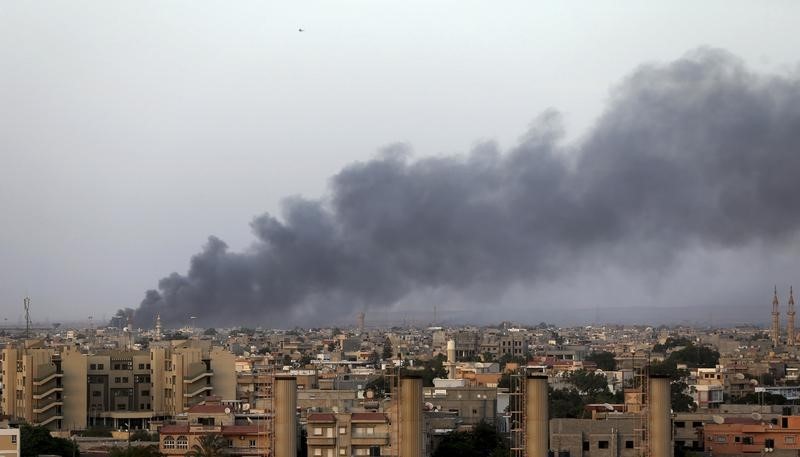REUTERS - Libya to get electricity from Egypt, Tunisia to ease blackouts - Tripoli govt

TRIPOLI/BENGHAZI, Libya, Aug 5 (Reuters) - Libya will import electricity from Egypt and Tunisia and rent generators as it struggles with power outages that have plunged its main cities into darkness, the Tripoli government said.
Four years of fighting following the ousting of leader Muammar Gaddafi has hobbled Libya's oil industry and power grid, with damaged plants and foreign firms reluctant to deliver spare parts needed to repair them.
Outages in the capital Tripoli lasting up to 18 hours a day have forced Libya's biggest steelmaker in the western city of Misrata to shut and some bakeries and petrol stations have also closed.
The blackouts are even worse in the east where the main city of Benghazi has seen only sporadic power in the past few days, shutting down the mobile phone network for much of the day.
Libya will get 250 megawatts (MW) (0.25 gigawatts GW) of electricity from neighbouring Tunisia and 75 MW from Egypt, Khalifa al-Ghwell, Prime Minister of Libya's Tripoli-based government, which is not internationally recognised, told a news conference late on Tuesday.
Al-Ghwell said his government had also rented generators with a capacity of 240 MW, adding that the closure of steel firm Lisco would save 100 MW which will be fed into the Tripoli grid.
There are also plans to restart the Sarir power plant this week, he said, without saying how the deliveries from Egypt and Tunisia would be funded.
An Egyptian electricity official said Libya could get 100 megawatts under an existing agreement. Khalid Said, an official at the state power firm in Benghazi, said eastern Libya needed an extra 1,000 megawatts.
The company had plants with a capacity 1,500 megawatt west of Benghazi but fighting had disrupted the grid, he said. Several masts had been destroyed.
In November, APR Energy Plc said it had suspended its Libya operations, citing unfinished paperwork by Libyan authorities regarding renewal of a 450-MW power contract.
Al-Ghwell is prime minister of the National Salvation government set up in Tripoli after an alliance of armed factions called Libya Dawn took control of the capital in August 2014.
It controls key state bodies there such as ministries and the headquarters of the electricity company, while Libya's internationally recognised government has withdrawn to the east.
According to the U.S. Energy Information Administration, Libya's installed generation capacity was over 7 GW in 2012.
However, demand for electricity has more than doubled since 2000 as living standards have improved, outstripping capacity. It is estimated that power demand will increase two-and-a-half fold by the end of 2020. (additional reporting by Ehab Farouk in Cairo; Reporting by Ahmed Elumami; Writing by Ulf Laessing; Editing by David Evans and Susan Fenton)









facebook comments